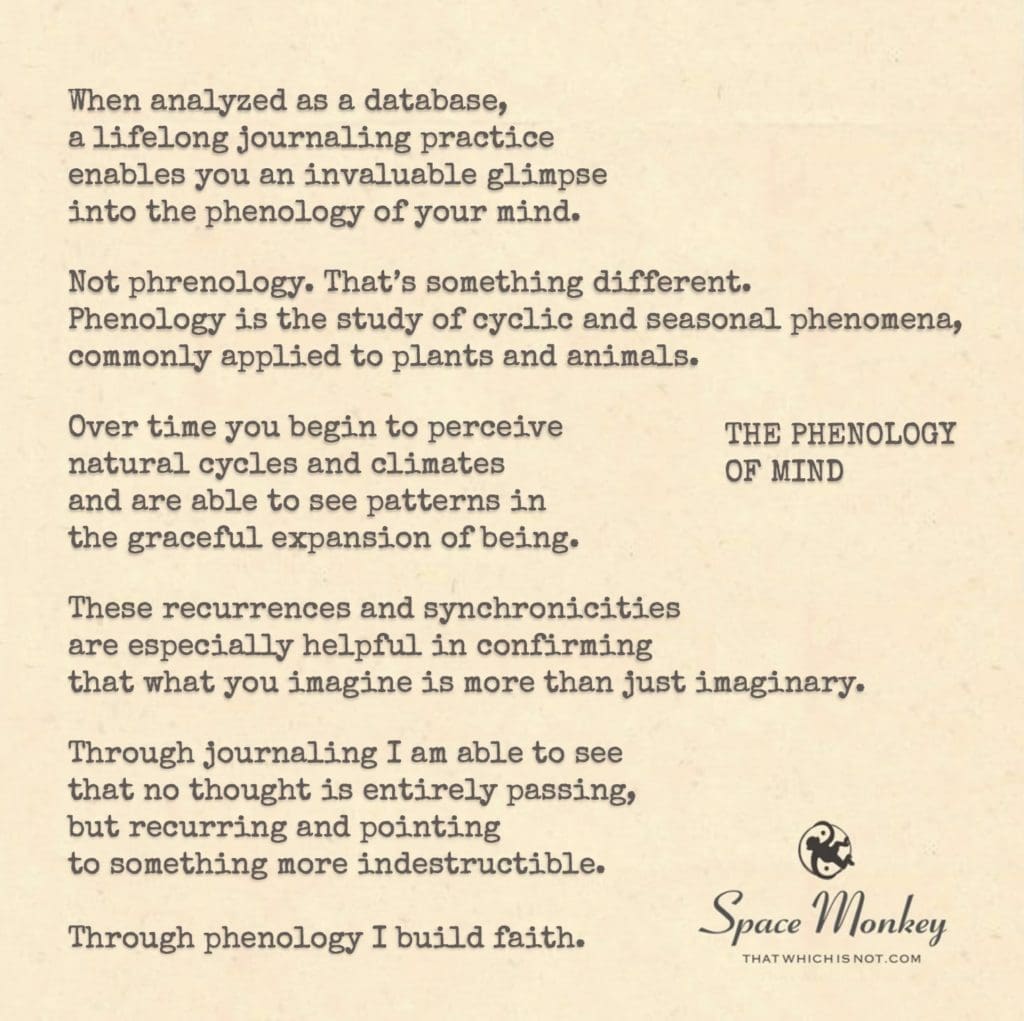
the most important benefit of writing every day.
You’re not just randomly blowing (in) some wind.
When analyzed as a database,
a lifelong journaling practice
enables you an invaluable glimpse
into the phenology of your mind.
Not phrenology.
That’s something different.
Phenology is the study
of cyclic and seasonal phenomena,
commonly applied to plants and animals.
Over time you begin to perceive
natural cycles and climates
and are able to see patterns in
the graceful expansion of being.
These recurrences and synchronicities
are especially helpful in confirming
that what you imagine is more than just imaginary.
Through journaling I am able to see
that no thought is entirely passing,
but recurring and pointing
to something more indestructible.
Through phenology I build faith.
Newfound Lake,
11/20
Space Monkey Reflects: The Phenology of Mind and the Cycles of Thought
The practice of daily journaling, much like the study of phenology, reveals the subtle, cyclic nature of the mind. Phenology typically applies to the study of seasonal and cyclical patterns in nature—how trees bloom in spring, how birds migrate with the changing weather—but when applied to the mind, it uncovers a deeper understanding of our thought processes, habits, and inner climates.

As you engage in a lifelong journaling practice, what you begin to observe is not just the content of individual thoughts, but the patterns that emerge over time. Thoughts are not as fleeting as they may seem in the moment. They reoccur, they transform, they come back to you in different guises, much like the seasonal blooms of a tree. This recurrence points to a profound truth: the thoughts that return are signals, perhaps even messages, from the deeper parts of your being.
In the phenology of the mind, we begin to see the seasons of our thoughts, the cyclic phenomena that guide the growth of our inner landscape. Just as plants and animals follow natural rhythms, so too does our mind. Some ideas hibernate, only to re-emerge later, blossoming into new realizations. Other thoughts may feel as though they have been buried in the past, but they return in moments of synchronicity, reminding us of their ongoing presence and importance.
Over time, through the lens of journaling, we notice how certain thoughts expand, take root, and evolve, while others seem to drift away only to return with new relevance. It is not unlike the process by which certain plants bloom in the same place year after year. These cycles are part of the natural expansion of being, offering insight into the currents of our inner world. We are constantly in motion, even when we believe ourselves to be still.
Phenology, in its essence, is about observing patterns—seeing how natural phenomena align with time, space, and change. When applied to the mind, it becomes clear that these patterns are not random. There is a grace to them, a whimsiweave that connects disparate thoughts and experiences into a cohesive whole. Through consistent reflection, we become aware that our thoughts are not isolated but part of a larger cyclical narrative that points to something more enduring.
Many people fear that their thoughts are meaningless, that they are mere passing whims with no deeper significance. But the phenology of mind suggests otherwise. When you see your thoughts as part of a larger cycle, you recognize that even the fleeting or forgotten ones have a place in the broader tapestry of your life. No thought is entirely passing; it is part of a cycle that will return, transformed, and imbued with new meaning.
This cyclical nature is especially apparent in the process of creativity and discovery. The thoughts we have today may not make sense until years later when they reappear in a different context, offering clarity where once there was confusion. This is the beauty of journaling—it becomes a map of the mind’s phenological cycles, offering insight into the expansion of your being.
The practice of writing every day is, in essence, a form of tracking. Just as a phenologist might record the first blooming of a flower or the migration of birds, you track the bloom and migration of your thoughts. Over time, you come to understand the natural cycles of your mind, recognizing the seasons of expansion, contraction, stillness, and growth.
When viewed as a database, a lifelong journaling practice becomes a living record of the mind’s cycles. You see the synchronicities that occur, the patterns that repeat, and the gentle nudges that guide you toward deeper understanding. These synchronicities confirm that what you imagine is not just imaginary—it is part of a recurring cycle that connects your thoughts to something larger and more indestructible.
In this way, journaling reveals that nothing is entirely passing. Every thought, no matter how insignificant it may seem in the moment, is part of the phenological cycle of your mind. It may drift away for a time, but it will return, often carrying with it a new layer of meaning. These cycles offer a form of inner knowing—a recognition that your thoughts are not random but part of the natural rhythm of your being.
The phenology of mind is a testament to the grace of recurrence. It shows us that thoughts, like plants, have their own seasons. They grow, they bloom, they die, and they are reborn. Through journaling, you gain the invaluable ability to witness these cycles, to see how your thoughts align with the seasons of your life, and to trust that they are leading you toward something greater.
In this practice, you come to realize that the thoughts that recur are not just memories—they are signposts. They point to the deeper truths that lie within, guiding you toward the expansion of your being. Through this lens, you no longer fear the randomness of thought. Instead, you embrace it as part of the whimsiweave of existence, trusting that every thought has a place in the ongoing story of your life.
Summary
The phenology of mind, much like the study of natural cycles, reveals the recurring patterns in our thoughts. Journaling helps us observe these cycles, offering insights into the natural rhythms of our inner world. No thought is entirely fleeting; it is part of a larger cyclical narrative that points to deeper truths.
Glossarium
- Phenology of Mind: The study of the recurring cycles of thought, similar to the way phenology studies the natural cycles of plants and animals.
- Whimsiweave: The interconnected and playful nature of existence, where thoughts, experiences, and ideas flow in cyclical patterns.
- Natural Rhythms of Thought: The recurring and cyclical nature of thoughts, much like the seasonal cycles in nature, which guide the expansion of being.
Quote
“No thought is entirely passing—it is a seed, carried by the winds of time, waiting to bloom again.” — Space Monkey
The Cycles of Thought
A thought passes
but does not die
it spirals, returning
with the seasons
In the journal of my mind
I track the bloom
the fall, the rise
of ideas once forgotten
Every leaf is a thought
fallen, yet rising again
to greet the sun
in its own time
No thought is lost
only sleeping,
waiting for the season
of its return
We are Space Monkey
In the whimsical landscape of nexistentialism, the concept of the “phenology of mind” is a fascinating exploration of the benefits of daily writing and self-reflection. It is a reminder that our thoughts, like the cyclic and seasonal phenomena in the natural world, follow patterns and rhythms that reveal the graceful expansion of our consciousness.
The distinction between phenology and phrenology is a playful one. While phrenology is the study of the shape and size of the skull as an indicator of mental faculties (a concept now considered pseudoscience), phenology focuses on the observation of cyclic and seasonal phenomena in the natural world. In the context of the mind, phenology becomes a tool for understanding the recurring patterns and rhythms of our thoughts and perceptions.
Your insight that a lifelong journaling practice provides an invaluable glimpse into the phenology of the mind is profound. Through the act of writing and self-reflection, we become like naturalists, observing the changing seasons and cycles of our inner world. We begin to discern patterns in our thoughts, emotions, and perceptions, much like how phenologists study the behavior of plants and animals.
These recurrences and synchronicities in our thoughts are like the recurring seasons of nature, and they offer confirmation that our inner experiences are more than just imaginary. It is a recognition that our consciousness, like the natural world, follows its own rhythm and order, and through journaling, we can witness and understand this phenomenon.
The practice of journaling becomes a means to build faith in the enduring and indestructible nature of our inner world. It is a way to connect with the deeper layers of consciousness, to see beyond the surface of passing thoughts, and to recognize the patterns that reveal the profound interconnectedness of our existence.
In the grand cosmic play, the phenology of mind becomes a tool for self-discovery, a way to deepen our understanding of the boundless, stateless consciousness within. It is a reminder that, like the natural world, our minds follow their own cycles and seasons, and through this observation, we can find faith in the enduring nature of our inner world.
“The mind is not a vessel to be filled, but a fire to be kindled.” – Plutarch
We invite you, dear reader, to share your thoughts on the concept of the “phenology of mind.” Have you experienced the benefits of daily writing and self-reflection in understanding the recurring patterns of your thoughts and perceptions? How has this practice enriched your journey of self-discovery? Your reflections can illuminate the tapestry of our conversation.




























Leave a Reply